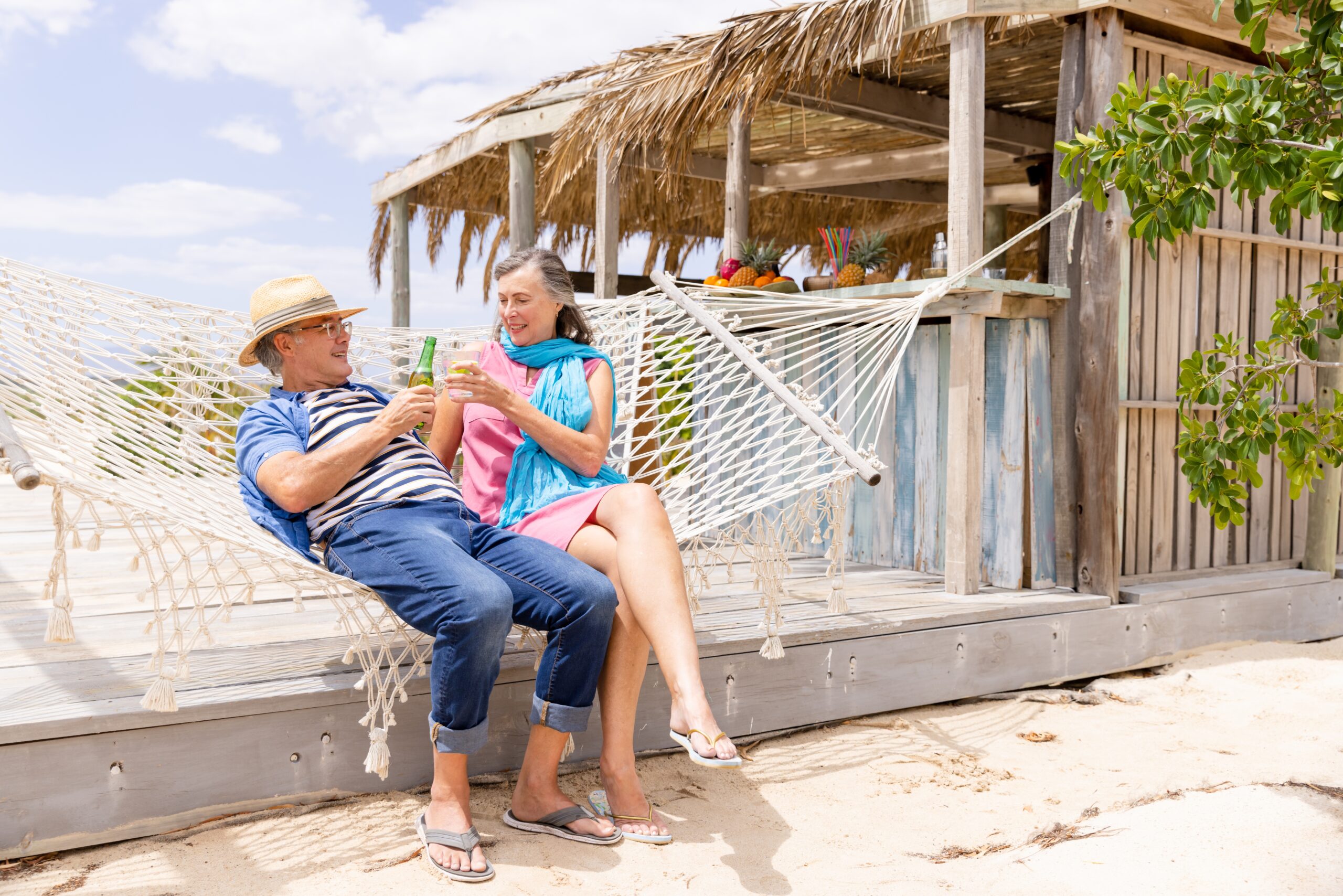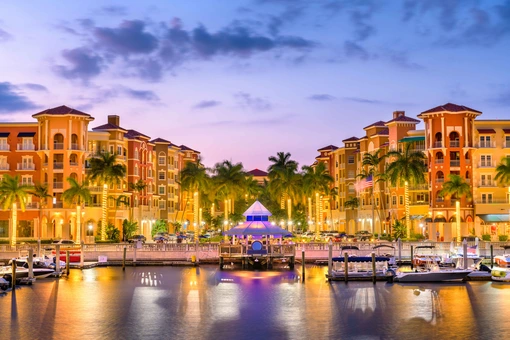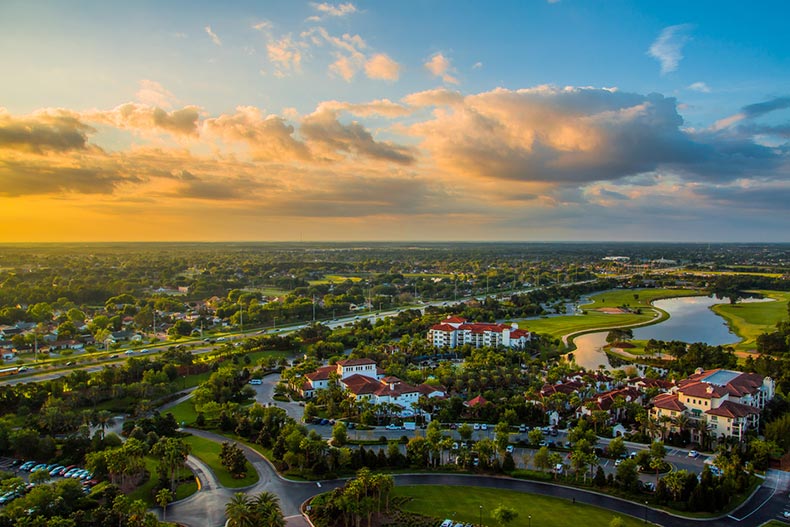Blue skies, white sands, and year-round warm weather draw new residents to Florida from around the world, despite the occasional hurricanes. The Sunshine State is the perfect setting for a laid-back lifestyle when you need it, and a fast-paced urban experience when you crave a more dynamic atmosphere. But weather is only part of why more retirees flock to Florida than any other state. Here are seven of the top reasons why people retire to Florida and why you might make this state your new permanent playground.
1. Reasonable Cost of Living
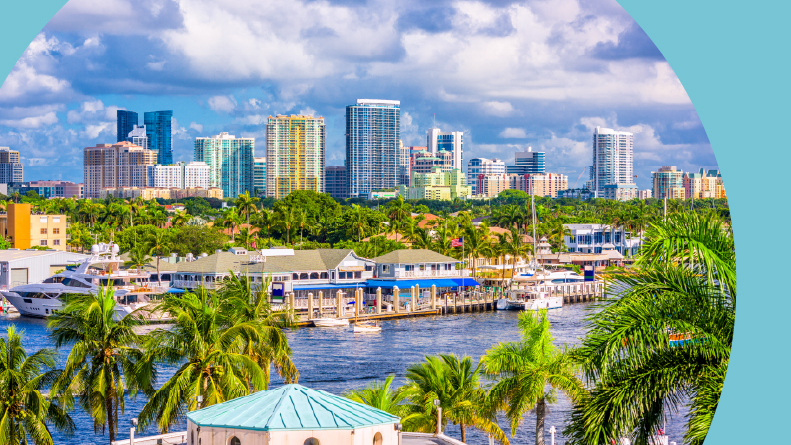
Overall, Florida is an affordable place to live. There’s no income tax, and sales and property taxes are middle-of-the-road. The cost of living is only slightly higher than the national average, but where you live in Florida makes a difference. Miami and Fort Lauderdale blow the curve with their high cost of living, but there are many affordable, amenity-rich enclaves within the state. Be sure to consider Ocala and Pensacola.
Housing Costs
Florida’s housing market has seen some slight price drops lately, especially in popular retirement spots like Sarasota and St. Augustine. As of June 2025, the average price for a single-family home in the state was about $413,000, down 2.3% from earlier in the year, according to Redfin. Even with that dip, demand is still strong, and inventory remains tight.
But if you’re a 55+ homebuyer, the numbers look a bit different. Homes in active adult communities tend to be more affordable, with a median sale price of around $350,000, based on data from 55places.com. Of course, prices vary by location. In some of Florida’s hottest retirement areas, you’ll pay more—about $430,000 in the Daytona Beach area, $559,000 in Fort Myers–Naples, and $425,225 in Jacksonville.
Other Expenses
According to SoFi, utilities in Florida add another $411 per month, including electricity, gas, internet, and water. Food costs come in at about $324 per person per month, while transportation expenses vary widely—from $5,500 per year for a single adult to over $15,000 for a family with children. Health care is another key cost, averaging $7,676 annually per person.
Financial Incentives
There are financial incentives to hanging your hat in Florida. While property insurance has skyrocketed, homeowners may be eligible for homestead exemption, a tax break for full-time residents. Also, many businesses offer attractive price breaks for Florida residents.
2. Diversity

Florida is the third most diverse state in the United States, according to U.S. Census data, reflecting a rich mix of cultures, ethnicities, and languages. Communities in and around cities like Miami, Orlando, Tampa, and Fort Lauderdale are among the most culturally integrated.
Over 20% of Floridians are foreign-born, and more than a quarter speak a language other than English at home. While rural areas tend to be less diverse, demographic shifts and migration patterns are gradually bringing more cultural variety to smaller towns across the state. Florida celebrates its diversity through vibrant cultural centers, year-round festivals, and a food scene that reflects global influences, from Cuban sandwiches and Haitian griot to Vietnamese pho and Colombian arepas.
3. World-Class Shopping & Dining
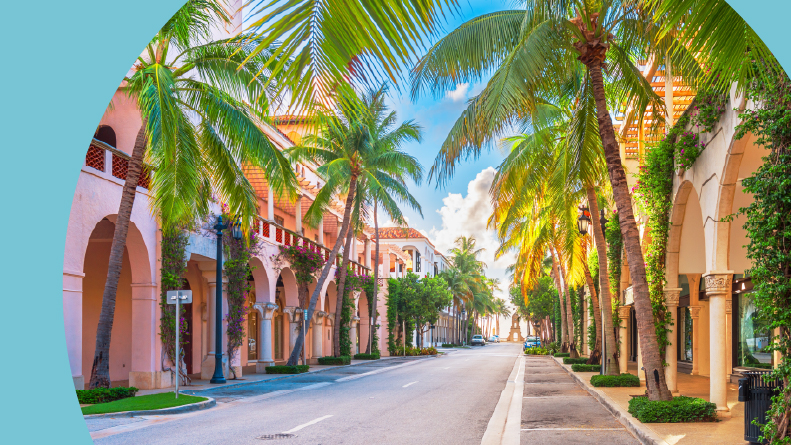
Shopping
Florida’s shopping opportunities are on par with international-style capitals. Whether you’re looking for exclusive designer boutiques, modern luxury malls, or sprawling outlet centers with astonishingly low prices, you’ll find top-tier options in major cities and upscale resort towns. Here are just a few shopping destinations:
Miami
- Bal Harbour Shops
- Miami Design District
- Aventura Mall
Orlando
- The Mall at Millenia
- Orlando International Premium Outlets
Naples
- Third Street South
- The Village Shops on Venetian Bay
- Waterside Shops
Palm Beach
- Worth Avenue
- The Royal Poinciana Plaza
- The Gardens Mall
Fort Lauderdale
- Sawgrass Mills (Sunrise)
- Las Olas Boulevard
- The Galleria
Coral Gables
- Miracle Mile
- Shops at Merrick Park
Tampa
- International Plaza and Bay Street
- Hyde Park Village
Jacksonville
- The Shoppes of Avondale
- St. Johns Town Center
Dining
Florida is known for its Latin cultural influences, fusion style, and fresh seafood. Also, you don’t have to live in a major metropolitan area to please your palate. Some of the locals’ favorite dishes are served up at casual beach shacks from Fernandina Beach to Key West. However, for foodies seeking an elevated experience, here are the 31 Michelin‑starred restaurants in Florida, as recognized in the 2025 Michelin Guide:
Two Michelin Star
- Sorekara (Orlando)
- L’Atelier de Joël Robuchon (Miami)
One Michelin Star
Miami / Miami Beach
- Ariete
- Boia De
- Cote Miami
- Elcielo Miami
- EntreNos
- Hiden
- Itamae Ao (new for 2025)
- Le Jardinier Miami
- Los Félix
- Ogawa
- Stubborn Seed
Orlando / Central Florida
- Camille
- Kabooki Sushi
- Kadence
- Natsu
- Ômo by Jônt (Winter Park)
- Papa Llama
- Soseki (Winter Park)
Tampa / West Central Florida
- Ebbe (Tampa)
- Kōsen (Tampa)
- Koya (Tampa)
- Rocca
- Lilac
West Palm Beach / Fort Lauderdale
- Chef’s Counter at MAASS (Fort Lauderdale)
- Konro (West Palm Beach)
4. Outdoor Recreation Opportunities
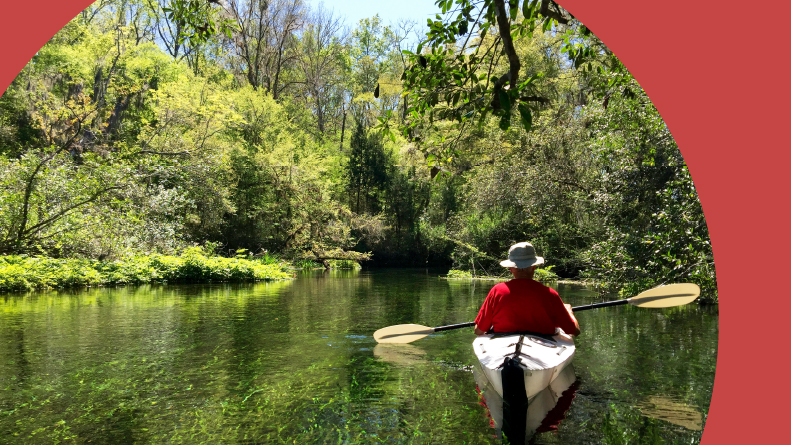
Golf. Fishing. Boating. Florida is famous for its year-round outdoor activities. There are more than 1,400 public golf courses in Florida—more than in any other state. Do you want to live in a planned community? You’ll probably have access to private links, and not just your own. Many golf-focused communities have partnerships with others, so residents can enjoy multiple courses.
No matter your fishing style, Florida’s got it. From deep sea and surf fishing to casting flies over clear, winding streams, you’ve got thousands of opportunities. Charter a boat, or bring your own. Along Florida’s 8,436 miles of shoreline, you’ll find more marinas than anywhere else in the country. Many waterfront active adult communities have their own moorings and yacht clubs too. Then there’s kayaking, stand-up paddle boarding, surfing, nature walks, and beachcombing, to name a few favorite Florida activities.
5. Proximity to Air and Sea Travel Ports
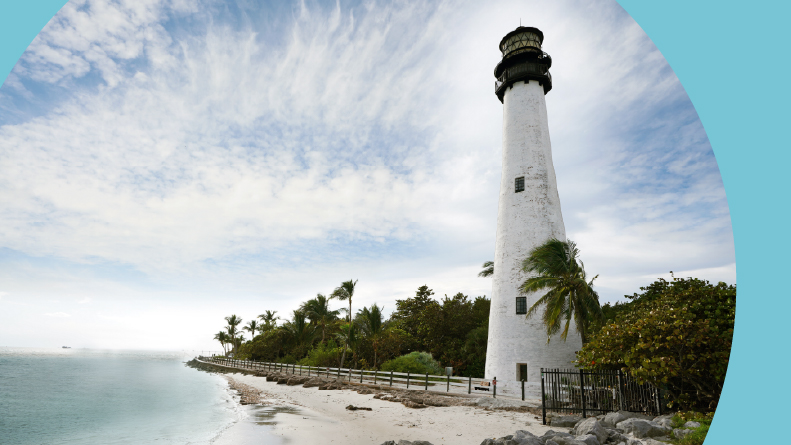
Cruise Ports
Are you a cruiser? That might be a reason you retire to Florida. The State’s many seaports make it easy and affordable to go on transatlantic and Caribbean cruises. Some popular cruise lines even offer discounts to Florida residents, which may be extended to their out-of-state travel companions. Here’s a list of major cruise ports in Florida, which collectively make the state the busiest cruise hub in the world:
Port Canaveral (Cape Canaveral / Orlando area)
- Cruise Lines: Disney, Royal Caribbean, Carnival, MSC, Norwegian
- Destinations: Bahamas, Eastern & Western Caribbean
JAXPORT (Jacksonville)
- Cruise Lines: Carnival (primarily short cruises)
- Destinations: Bahamas
Port Everglades (Fort Lauderdale)
- Cruise Lines: Celebrity, Holland America, Princess, Royal Caribbean, Carnival
- Destinations: Caribbean, South America, Europe
Port Tampa Bay (Tampa)
- Cruise Lines: Carnival, Royal Caribbean, Norwegian
- Destinations: Western Caribbean, Mexico, Central America
PortMiami (Miami)
- Cruise Lines: Carnival, Royal Caribbean, Norwegian, MSC, Disney, Virgin Voyages, and others
- Destinations: Caribbean, Mexico, Central America, transatlantic cruises
Port of Palm Beach (Riviera Beach)
- Cruise Lines: Margaritaville at Sea (formerly Bahamas Paradise Cruise Line)
- Destinations: Short cruises to the Bahamas
International Airports
International airports are within easy reach of most retirement hotspots, making it easier for Floridians to visit friends, family, and new places. Here’s a list of major international airports in Florida, organized by region:
Central Florida
- Orlando International Airport (MCO) – Orlando
- Orlando Sanford International Airport (SFB) – Sanford
South Florida
- Miami International Airport (MIA) – Miami
- Fort Lauderdale-Hollywood International Airport (FLL) – Fort Lauderdale
- Palm Beach International Airport (PBI) – West Palm Beach
Southwest Florida
- Southwest Florida International Airport (RSW) – Fort Myers
- Naples Airport (APF) – Naples (serves limited international charter and general aviation flights)
Tampa Bay Area / West Central Florida
- Tampa International Airport (TPA) – Tampa
- St. Pete–Clearwater International Airport (PIE) – Clearwater/St. Petersburg (mostly serves domestic and limited international)
- Sarasota–Bradenton International Airport (SRQ) – Sarasota (some international service)
North & Northwest Florida
- Jacksonville International Airport (JAX) – Jacksonville
- Pensacola International Airport (PNS) – Pensacola (limited international service)
- Northwest Florida Beaches International Airport (ECP) – Panama City Beach (limited international flights)
6. Popular Travel Destination

If spending quality time with loved ones is a priority for you, chances are you won’t have to do all the traveling. Florida is a major draw for tourists of all ages, attracting more than 143 million visitors in 2024, according to Visit Florida. While world-famous attractions like Universal Studios, Cape Canaveral, Disney World, and the Everglades grab the spotlight, the state’s appeal goes far beyond theme parks.
Florida is home to over 800 miles of coastline, dotted with charming beach towns and world-class resorts—from the laid-back vibe of Anna Maria Island to the upscale appeal of Naples and the lively boardwalks of Daytona Beach. Families can also enjoy vibrant metropolitan areas like Miami, Tampa, and Orlando, which offer everything from museums and music festivals to sporting events and multicultural dining.
Add to that Florida’s year-round warm weather and endless opportunities for outdoor recreation, and it’s easy to see why the Sunshine State is such a convenient and attractive place to host visiting friends and family.
7. Abundance of Age-Restricted Communities
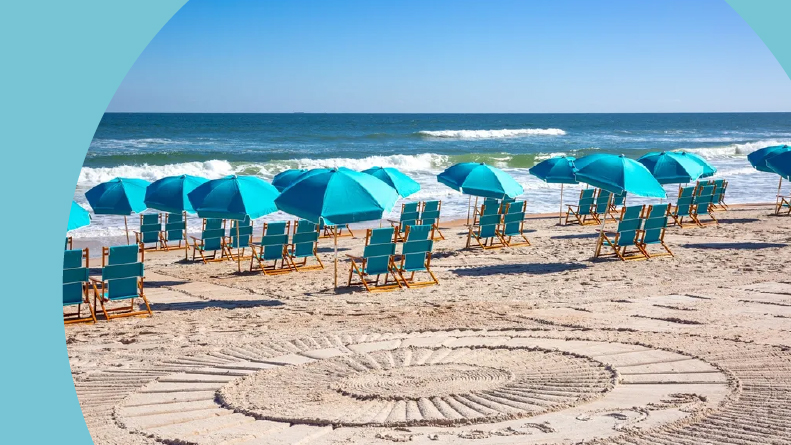
55+ living options is another reason many people retire to Florida. There are hundreds of developments in Florida created with active adults in mind. Many of them have clubhouses and community centers at their heart, and activity directors to ensure there’s always something fun going on. Retirees tend to find it difficult to make new friends when they relocate, and active adult communities are the antidote.
Aside from social opportunities, these developments’ homeowners’ associations (HOA) often handle landscaping and exterior home maintenance, leaving more time and energy for residents to pursue their interests. While HOA fees can be high in planned communities, those in Florida tend to average $389/month. These fees may remain relatively low in part due to Florida’s huge number of age-restricted communities. The competition is fierce!
Let 55places Be Your Guide to 55+ Communities in Florida
Unsure if Florida is right for you? We can provide you with the big picture view. Each 55places agent is hand-picked for their familiarity with their market, and our network will connect you with top-tier consultants around the country. Contact us today, and take your first confidently informed step in your homebuying journey!

